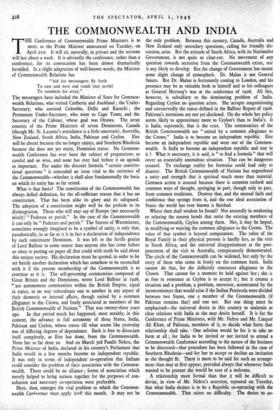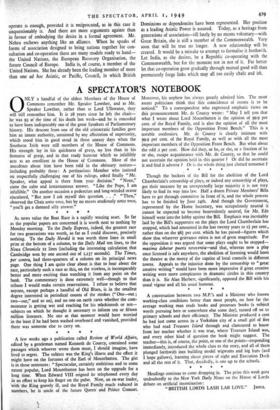THE COMMONWEALTH AND INDIA
T. HE Conference of Commonwealth Prime Ministers is to meet, as the Prime Minister announced on Tuesday, on April 21st. It will sit, naturally, in private and the sessions will last about a week. It is advisedly the conference, rather than a conference, for its convocation has been almost dramatically heralded. In a slight adaptation of well-known words, the Minister of Commonwealth Relations has
" bid his messengers fly forth
To east and west and south (not north)
To summon his array."
The messengers have included the Minister of State for Common- wealth Relations, who visited Canberra and Auckland ; the Under- Secretary, who covered Colombo, Delhi and Karachi ; the Permanent Under-Secretary, who went to Cape Town, and the Secretary of the Cabinet, whose goal was Ottawa. The array consists of the Prime Ministers of seven Dominions, Canada (though Mr. St. Laurent's attendance is a little uncertain), Australia, New Zealand, South Africa, India, Pakistan and Ceylon. Eire will be absent because she no longer enjoys, and Southern Rhodesia because she does not yet enjoy, Dominion status. No Common- wealth Conference has ever been the subject of preparations so careful and so wise, and none has ever had before it an agenda so important. For under the discreet formula " certain constitu- tional questions " is concealed an issue vital to the existence of the Commonwealth—whether it shall alter fundamentally the basis on which its unity has so far rested.
What is that basis? The constitution of the Commonwealth has always defied definition, for the all-sufficient reason that it has no constitution. That has been alike its glory and its safeguard. The adoption of a constitution might well be the prelude to its disintegration. Those who will may say of Europe (not necessarily wisely) " Federate or perish." In the case of the Commonwealth it can only be " Federate and perish." The Statute of Westminster, sometimes wrongly imagined to be a symbol of unity, is only that, paradoxically, in so far as it is in fact a declaration of independence by each constituent Dominion It was left to the fertile genius of Lord Balfour to come nearer than anyone else has come before or since to putting on paper all that could with truth be said about this unique society. His declaration must be quoted, in order to be set beside another declaration which has somehow to be reconciled with it if the present membership of the Commonwealth is to continue as it is. The self-governing communities composed of Great Britain and the Dominions, wrote Lord Balfour in 1926, "'are autonomous communities within the British Empire, equal in status, in no way subordinate one to another in any aspect of their domestic or internal affairs, though united by a common allegiance to the Crown, and freely associated as members of the British Commonwealth of Nations." That was twenty-three years ago. In that period much has happened, most notably, in this context, the advance to full autonomy of three States, India, Pakistan and Ceylon, whose status till what seems like yesterday was of differing degrees of dependence. Each is free to dissociate itself completely, as Eire has done, from the Commonwealth. None has so far done so. And on March 3rd Pandit Nehru, the Prime Minister of India, declared in his country's Parliament that India would in a few months become an independent republic. It was only in terms of independent co-operation that Indians could consider the problem of their association with the Common- wealth. There could be no alliance ; forms of association which merely helped to bring nations together for the purposes of con- sultation and necessary co-operation were preferable.
Here, then, emerges the vital problem to which the Common- wealth Conference must, apply itself this month. It may not be the only problem. Between this country, Canada, Australia and New Zealand only secondary questions, calling for friendly dis- cussion, arise. But the attitude of South Africa, with its Nationalist Government, is not quite so clear-cut. No movement of any question towards secession from the Commonwealth exists, nor is any likely to develop. But the change of Government has meant some slight change of atmosphere. Dr. Malan is not General Smuts. But Dr. Malan is fortunately coming to London, and his presence may be as valuable both to himself and to his colleagues as General Hertzog's was at the conference of 1926. All this, however, is subsidiary to the dominating problem of India. Regarding Ceylon no question arises. She accepts unquestioning and unreservedly the status defined in the Balfour Report of 1926. Pakistan's intentions are not yet disclosed. On the whole her policy seems likely to approximate more to Ceylon's than to India's. It is India, supremely, that is the crux. The communities of the British Commonwealth are " united by a common allegiance to the Crown." India is to become an independent republic. Eire became an independent republic and went out of the Common- wealth. Is India to become an independent republic and stay in it ? What is necessary, it is said, is " to find a formula " that will cover an essentially anomalous situation. That can be dangerous counsel. To exchange reality for formulas could lead only to disaster. The British Commonwealth of Nations has engendered a unity and strength that is spiritual much more than material. Common action is assured because there is common outlook and common ways of thought, springing in part, though only in part, from common traditions. Destroy that, and the mutual faith and confidence that springs from it, and the one ideal association of States the world has ever known is finished.
Where then shall wisdom be found? Not assuredly in weakening or relaxing the unseen bonds that unite the existing members of the Commonwealth, Ceylon among them. Not, it may be hoped, in modifying or waiving the common allegiance to the Crown. The value of that symbol is beyond computation. The value of the Royal Family in their physical persons is hardly less, as the visit to South Africa, and the universal disappointment at the post- ponement of the visit to Australia, conspicuously demonstrated. The circle of the Commonwealth can be widened, but only by the entry of those who come in freely on the common basis. India cannot do that, for she definitely renounces allegiance to the Crown. That cannot for a moment be held against her ; she is as free to renounce as Ceylon is to accept it ; but it creates a situation and a problem, a problem, moreover, accentuated by the inconveniences that would arise if the Indian Peninsula were divided between two States, one a member of the Commonwealth (if Pakistan remains that) and one not. But one thing must be emphasised—the universal desire in this country to maintain as close relations with India as she may desire herself. It is for the Conference of Prime Ministers, with Mr. Nehru and Mr. Liaquat Ali Khan, of Pakistan, members of it, to decide what form that relationship shall take. • One solution would be for it to take no form at all ; for India to be invited or not invited to attend a Commonwealth Conference according to the nature of the business to be discussed—that procedure has been followed in the case of Southern Rhodesia—and for her to accept or decline an invitation as she thought fit. There is more to be said for such an arrange- ment than may at first appear, provided always that whenever India wanted to be present she would be sure of a welcome.
A relationship more formal than that it will be difficult to devise, in view of Mr. Nehru's assertion, repeated on Tuesday, that what India desires is to be a Republic co-operating with the Commonwealth.. That raises no difficulty. The desire to co- operate is enough, provided it is reciprocated, as in this case it unquestionably is. And there are more arguments against than in favour of embodying the desire in a formal agreement. Mr. Nehru eschews anything like an alliance. When he speaks of forms of association designed to bring nations together for con- sultation and co-operation there are many models ready to hand— the United Nations, the European Recovery Organisation, the future Council of Europe. India is, of course, a member of the United Nations. She has already been the leading member of more than one ad hoc Asiatic, or Pacific, Council, in which British Dominions or dependencies have been represented. Her position as a leading Asiatic Power is assured. Today, as a heritage from generations of association—till lately by no means voluntary--with Great Britain, she is still a member of the Commonwealth. Very soon that will be true no longer. A new relationship will be created. It would be a mistake to attempt to formalise it forthwith. Let India, as she desires, be a Republic co-operating with the Commonwealth, but for the moment not in nor of it. Far better let that co-operation grow gradually through mutual good will than prematurely forge links which may all too easily chafe and irk.







































 Previous page
Previous page